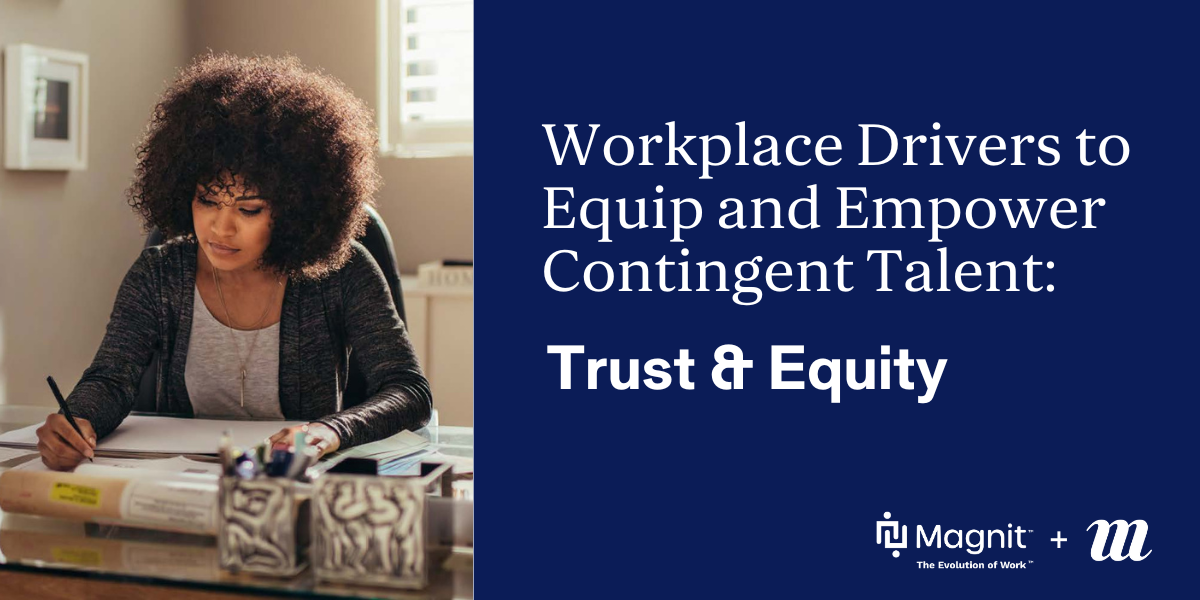The contingent workforce continues to grow around the world, becoming an increasingly critical and integral segment for more and more organizations. To gain a competitive advantage in the war for talent, businesses need to better understand what drives contingent workers. A recent report by Werklabs, The Mom Project, and Magnit: “Defining What Matters to the Extended Workforce: Key Drivers for Attracting, Equipping, and Empowering Contingent Labor,” examines what matters most to contingent workers and outlines specific actions organizations can take to attract and retain top talent for a positive and productive work experience. In this series, The Mom Project and Magnit explore the six key drivers that impact contingent workers' career optimism and work experience: equity, success, trust, respect, support, and belonging.
Contingent work is a growing force that is taking the employment world by storm, helping companies fill unique talent gaps, offering flexibility that aligns with workers’ needs and elevating DEIB initiatives. Moreover, it is becoming a critical pathway for moms and women of color to take a viable next step in their careers, pivot industries, and refine newly learned skills.
Experts predict that the contingent workforce will grow by 53% worldwide in 2023 — and the momentum shows no signs of slowing down.
While being a contingent worker can offer multiple benefits, the path isn’t without its drawbacks. Some workers report feeling isolated from their full-time employee peers — an unfortunate circumstance that could drive great workers away. The good news? This doesn’t have to be the case. Companies have the power to transform their relationships with their contingent workforce, and it doesn’t require a massive overhaul of operations. Rather, the key is to understand that all workers want to feel valued and included, no matter what their employment classification is. This is especially true for women and people of color, groups who have historically been excluded. Two of the biggest ways that companies can foster inclusive environments are through trust and equity.
As Chief Equity & Impact Officer at The Mom Project, I believe that we must prioritize DEIB initiatives as both business imperatives and human imperatives. Fostering trust and equity is key to building bonds in the workplace, not just for contingent workers, but for the organization as a whole. Focusing on these factors, business leaders can build stronger, more diverse workplaces where all workers can thrive and business operations improve as a result.
The RISE of moms returning to work
For many, contingent work offers a viable bridge from a career gap back into the workforce. The Mom Project’s RISE program offers scholarships for women, particularly moms of color, accelerating equity by providing access to tech upskilling opportunities. Research has shown that RISE participants find job searching and career navigation to be particularly challenging. They spend lots of time applying for jobs with limited time and energy — and, even so, find it hard to reenter the workforce or break into a new industry.
Enter contingent work, which can help many get their foot in the door.
However, it’s important to remember that contingent work may not be what those returning to the workforce initially set out to do. While many professionals choose project-based work for the flexibility, others reluctantly pursue contingent opportunities when finding a permanent position proves difficult. For these workers, the ideal situation would be finding contract work that provides an opportunity to full-time work.
Often, factors such as needing benefits cause some to prefer permanent employment over contingent work, something that may be necessary for groups such as single parents. Still, companies can improve the contingent worker experience by leaning into actions that increase both equity and trust.
Ensuring equity at work
Equality seeks to treat everyone the same, but equity looks more deeply at underlying circumstances and provides what is needed for true fairness. The difference between these two concepts can mean all the difference in creating a more inclusive and equitable environment for contingent workers.
Our data shows that contingent workers prioritize three primary factors when determining if a workplace is equitable and evaluating whether the organization is one at which they could feel a sense of belonging:
- Opportunity: Contingent workers feel valued when they have the resources and opportunity to do their jobs well and share their opinions in the workplace.
- Transparency: The way organizations communicate and freely share information can make an impact on how included contingent workers feel.
- Fair and sincere treatment: Just like their full-time counterparts, contingent workers want to feel like “more than just a number,” knowing that companies care about their well-being.
While inclusion matters to all contingent workers, there were two groups for whom these efforts impacted the most. Black contingent workers placed significant emphasis on equity as a driver for inclusion, with 90.2 percent identifying it as critical. Gender also influenced the importance of equity, with females citing equity as being critical at a higher rate than their males counterparts — 86.9 percent vs. 81.7 percent.
The importance of trust
Not feeling trusted to do the job they are hired to do is a common barrier faced by contingent workers. Feeling trusted and included often go hand-in-hand for the contingent workforce. When left out of company communications, this can lead to feelings of isolation and the perception of being untrustworthy. This pillar was shown to be of particular importance to Black and Hispanic workers.
You can instill a sense of trust by giving contingent workers substantive work responsibilities and demonstrating that you believe they will meet project and work standards. While these measures will fall to management — and, truthfully, the road to feeling trusted will largely be paved by leaders — co-workers can play a vital role in showing contingent workers they are trusted.
In fact, 90% of contingent workers agree that simply having co-workers act like team players with a common goal makes them feel more trusted in project-based roles.
By recognizing the contributions of contingent workers and connecting them to meaningful, impactful work, we bridge the gap between our business imperatives and human progress. It's an undertaking that allows us to reach excellent results while moving our collective purpose forward.
Looking to the future
What does this mean for the future of work? Contingent work is, and will continue to be, a rapidly expanding segment of many organizations. With this will come increased competition for talent. How companies create the contingent worker experience will be critical in retaining that workforce.
In spite of the challenges they face, we found that RISE participants are extremely optimistic and hopeful for their future work experience. More than anything, they feel empowered when they are part of companies that value their diversity, appreciate their unique work backgrounds and contributions and honors them as individuals.
Simply put: the power to drive a positive experience is in the hands of companies. By building more equitable and inclusive workplaces, we are unlocking possibilities for all.
Stay tuned for the next blog in this series by Magnit and The Mom Project.
Read more about the what matters most to contingent workers and what specific actions organizations can take to attract and retain top talent for a positive and productive work experience in the full report from Werklabs, The Mom Project, and Magnit: “Defining What Matters to the Extended Workforce: Key Drivers for Attracting, Equipping, and Empowering Contingent Labor,”



.png)